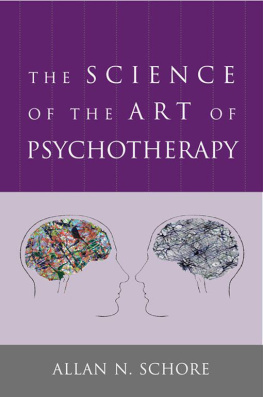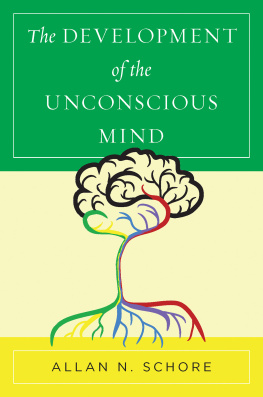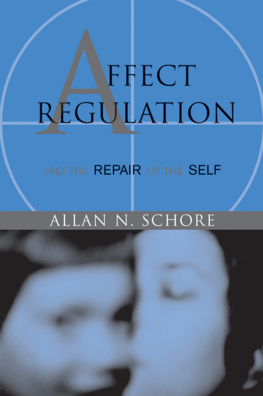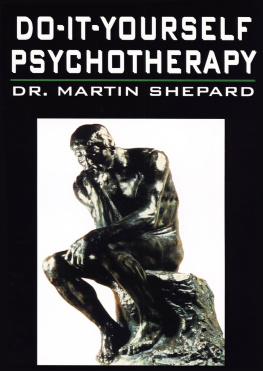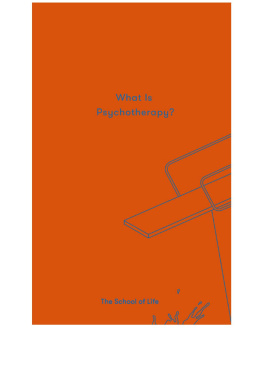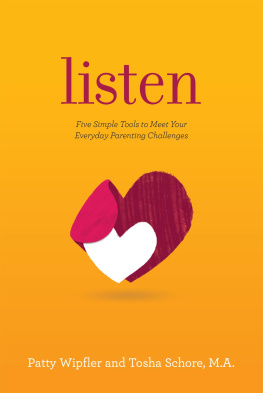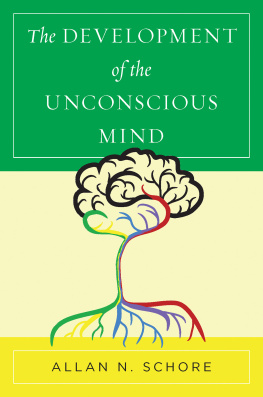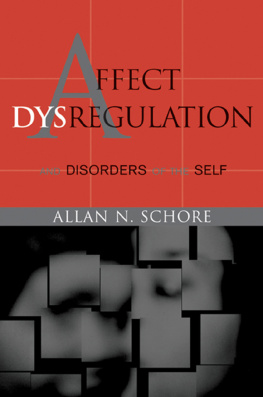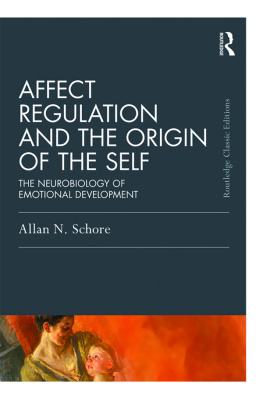Schore - The Science of the Art of Psychotherapy
Here you can read online Schore - The Science of the Art of Psychotherapy full text of the book (entire story) in english for free. Download pdf and epub, get meaning, cover and reviews about this ebook. year: 2012, publisher: Norton, genre: Romance novel. Description of the work, (preface) as well as reviews are available. Best literature library LitArk.com created for fans of good reading and offers a wide selection of genres:
Romance novel
Science fiction
Adventure
Detective
Science
History
Home and family
Prose
Art
Politics
Computer
Non-fiction
Religion
Business
Children
Humor
Choose a favorite category and find really read worthwhile books. Enjoy immersion in the world of imagination, feel the emotions of the characters or learn something new for yourself, make an fascinating discovery.
- Book:The Science of the Art of Psychotherapy
- Author:
- Publisher:Norton
- Genre:
- Year:2012
- Rating:3 / 5
- Favourites:Add to favourites
- Your mark:
- 60
- 1
- 2
- 3
- 4
- 5
The Science of the Art of Psychotherapy: summary, description and annotation
We offer to read an annotation, description, summary or preface (depends on what the author of the book "The Science of the Art of Psychotherapy" wrote himself). If you haven't found the necessary information about the book — write in the comments, we will try to find it.
Schore: author's other books
Who wrote The Science of the Art of Psychotherapy? Find out the surname, the name of the author of the book and a list of all author's works by series.
The Science of the Art of Psychotherapy — read online for free the complete book (whole text) full work
Below is the text of the book, divided by pages. System saving the place of the last page read, allows you to conveniently read the book "The Science of the Art of Psychotherapy" online for free, without having to search again every time where you left off. Put a bookmark, and you can go to the page where you finished reading at any time.
Font size:
Interval:
Bookmark:
The Norton Series on Interpersonal Neurobiology
Allan N. Schore, PhD, Series Editor
Daniel J. Siegel, MD, Founding Editor
The field of mental health is in a tremendously exciting period of growth and conceptual reorganization. Independent findings from a variety of scientific endeavors are converging in an interdisciplinary view of the mind and mental well-being. An interpersonal neurobiology of human development enables us to understand that the structure and function of the mind and brain are shaped by experiences, especially those involving emotional relationships.
The Norton Series on Interpersonal Neurobiology will provide cutting-edge, multidisciplinary views that further our understanding of the complex neurobiology of the human mind. By drawing on a wide range of traditionally independent fields of researchsuch as neurobiology, genetics, memory, attachment, complex systems, anthropology, and evolutionary psychologythese texts will offer mental health professionals a review and synthesis of scientific findings often inaccessible to clinicians. These books aim to advance our understanding of human experience by finding the unity of knowledge, or consilience, that emerges with the translation of findings from numerous domains of study into a common language and conceptual framework. The series will integrate the best of modern science with the healing art of psychotherapy.
A NORTON PROFESSIONAL BOOK

To Judy
I love you in a place
Where theres no space and time
I love you for my life
You are a friend of mine
May your hands always be busy
May your feet always be swift
May you have a strong foundation
When the winds of changes shift
May your heart always be joyful
And may your song always be sung
May you stay forever young
Forever young, forever young
May you stay forever young
Bob Dylan, Forever Young
_____________
Contents
With Judith R. Schore
With Gay Bradshaw
With Russell Meares and Dmitry Melkonian
With Ruth Newton
With Jennifer McIntosh
_____________
Acknowledgments
O ver the last decade I have been heartened and deeply gratified by the reception of my work from so many sources. This substantial feedback about the impact of my ideas has taken various forms: large numbers of citations by other authors in a wide variety of clinical and scientific literatures, numerous stimulating dialogues with audiences around the world, direct expressions of interest and appreciation from my professional colleagues, and, via electronic communication, frequent contact from individuals in various walks of life whom I have not met, yet who felt compelled to express the personal meaning my work has had for them.
I would like to thank a number of people who have been fundamentally essential to this wide-reaching response to my writings. I am indebted to the translators of Affect Regulation and the Repair of the Self into Italian, French, and German: Roberto Speziale-Bagliacca, Giles de Lisle, and Eva Rass; and to Andre Sassenfelds Spanish translation of my articles. It has been my pleasure to work with the following editors who have invited me to share my ideas in a number of clinical volumes and journals: Darcia Narvaez, Ruth Lanius, Barry Lester, Joshua Sparrow, Tessa Baradon, Diana Fosha, Paul Dell, John ONeil, Jean Petrucelli, Jennifer McIntosh, Larry Nazarian, Carol Tossone, Susanne Bennett, Judy Nelson, Nancy VanDerHeide, William J. Coburn, Charles Carlini, Joe Palombo, Rick Leonhardt, Dan Siegel, and George Halasz. Over the last decade I have also been enriched by my research collaborators: Russell Meares, Dmitriy Melkonian, Ruth Lanius, and Gay Bradshaw.
I want to express my appreciation to a group of conference organizers who have sponsored a number of important national and international appearances: Marion Solomon, Jane Ryan, Joe Tucci, Bob Cassidy, and Dan Hill. Over the years I continue to benefit from my interactions with the clinicians in my Study Groups in Developmental Affective Neuroscience & Clinical Practice in Los Angeles, Berkeley, Portland, Seattle, Boulder, and Austin; and I extend thanks to the group leaders: Linda Chapman, Margaret Rossoff, David Willis, Sal Ziz, Sue Marriott, and Pat Ogden.
As editor of the Norton Series on Interpersonal Neurobiology, it has been a pleasure interacting with all the series authors, as well as with my colleague at Norton, Deborah Malmud, who has been critical to its remarkable success. Thanks also to Vani Kannan, Ben Yarling, and especially Jean Blackburn for the work they have done in putting this book together.
On a more personal basis, I would like to thank Wolfgang Amadeus Mozart and Joseph Hayden for providing, on so many occasions, the background context that supports my creative musings. And I offer my gratitude to my childrenDavid, for the numerous times I relied on his professional computer skills, and Beth, for her talents in computer graphics and the design for the cover of this book.
But most of all, to Judy. Wing to wing, oar to oar.
_____________
Toward a New Paradigm of Psychotherapy
I n 1994, before the beginning of what was called the decade of the brain, I wrote my first book, Affect Regulation and the Origin of the Self: The Neurobiology of Emotional Development. In that work, which was published at the end of the last century, I offered a description of the interpersonal neurobiological mechanisms by which the attachment relationship facilitates the development of the major self-regulatory structures in the infants early maturing right brain. I also applied the developmental theory to generate models of the early etiology of a number of personality and psychiatric disorders that manifest fundamental deficits in affect regulation. Then, in expanding the regulation concept, I described the nonverbal affective mechanisms that lie at the heart of the psychotherapy process. In the course of the book I attempted to create an overarching interdisciplinary perspective that could more deeply explain some fundamental problems addressed by 20th-century developmental science, neurobiology, psychiatry, and psychoanalysis. At the time, the grounding of an entire volume in a transdisciplinary approach, as well as the proposal of an integrative overarching theory, was a radical prospect.
The book set out the major tenets of regulation theory, and everything I have written since then has elaborated on this interpersonal neurobiological model of the development, psychopathogenesis, and treatment of the implicit self. A fundamental principle of my work is that any developmental theory must integrate psychology and biology. For the last two decades, I have argued that no theory of human functioning can be restricted to only a description of psychological processes; it must also be consonant with what we now know about biological structural brain development. Three other themes that continue from literally the first paragraph of the first book are that the early stages of life are critical to the development of all later evolving structures and functions, that emotion is central to a deeper understanding of the human condition, and that unconscious processes lie at the core of the self, throughout the life span. The book thus also attempted to reintegrate psychoanalytic ideas of the unconscious mind into developmental science. Affect Regulation and the Origin of the Self which is now in its 14th printingwas the first book to document not the cognitive development, but the social-emotional development of the infant.
The decade of the brain, which spanned from approximately 1995 to 2005, heralded the appearance of innovative neuroimaging technologies that allowed for studying the brain as it is processing external and internal information. The amount of neurobiological research on emotional and social processes increased exponentially over this period. In 2003 I followed up my 1994 book with two volumes that documented my ongoing work during that interval. In addition to presenting a large body of more recent studies, I continued to utilize the lens of regulation theory to demonstrate the clinical application of this new data. In Affect Dysregulation and Disorders of the Self, I expanded my interpersonal neurobiological models in chapters on affective neuroscience and developmental neuropsychiatry, and in Affect Regulation and the Repair of the Self, to developmentally oriented psychotherapy and developmental neuropsychoanalysis. These two volumes thus appeared at the end of the initial critical period that bridged 19th-century classical and 20th-century modern neurosciences study of the brain, and classical and modern psychoanalysis study of the mind. In the preface of the 2003 Dysregulation volume, I observed, Over the course of what was known as the decade of the brain neuroscience experienced a remarkable growth spurt of new knowledge.
Next pageFont size:
Interval:
Bookmark:
Similar books «The Science of the Art of Psychotherapy»
Look at similar books to The Science of the Art of Psychotherapy. We have selected literature similar in name and meaning in the hope of providing readers with more options to find new, interesting, not yet read works.
Discussion, reviews of the book The Science of the Art of Psychotherapy and just readers' own opinions. Leave your comments, write what you think about the work, its meaning or the main characters. Specify what exactly you liked and what you didn't like, and why you think so.

